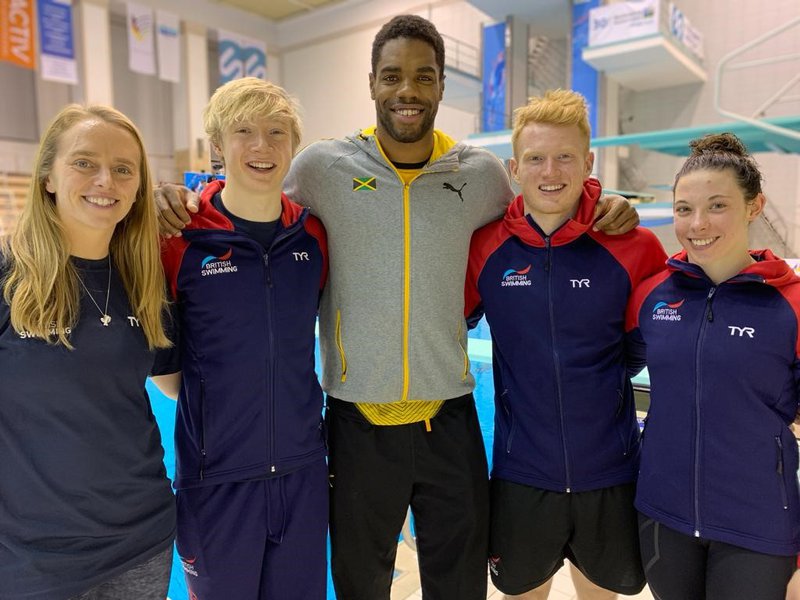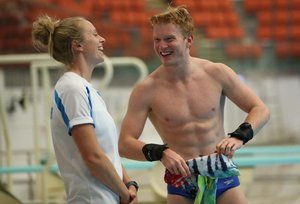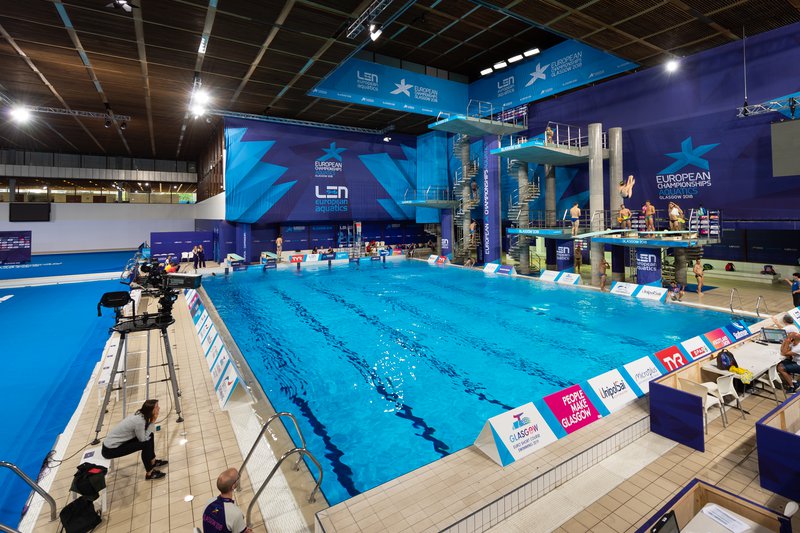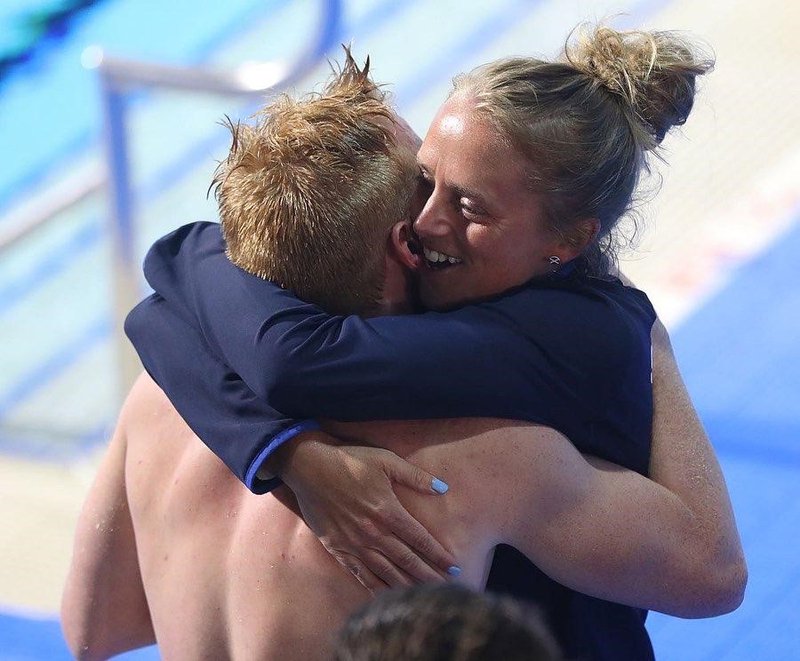When Jen Leeming considers the challenges that faced her divers at the height of the first lockdown, there is one that stands out for her.
Lack of access to the boards, dry dives and gyms that the athletes would usually use to train on a daily basis posed difficulties for the divers' physical routines, while it was also understandably tricky for them to run through the unique techniques of their sport in the normal way.
But for Leeming, Edinburgh Diving Club's Diving Performance Coach, it was the psychological impact of this turbulent time that she was most keen on monitoring among her group.
"When the first lockdown was announced back in March, there was initially that 'if, but, maybe' with the divers, when we didn't know what was happening. They wanted to train at home because we didn't know about the Olympics and other events like that, so we said 'let's keep training and doing what we can remotely'," she explains.
"All of them had certain areas that could be worked on, whether that was physio-focus areas because they were doing shoulder rehabilitations, or they'd got a lack of flexibility in their hips. We were saying, 'that's your focus, set your goals, everyone go away and think through goals that you can work on from home and let's focus on those'.
"But then it became apparent, as we went through the weeks and months, that things just weren't happening and we weren't going anywhere quickly.
"So at that point, it became a lot more about mental health and sticking together, connecting in any way we could - whether that was organising individual walks with the athletes, for the athletes to go out together individually. We had Zoom workouts, some through British Swimming, some through Scottish Swimming and then some ourselves, to try to get a bit of variety in there, to avoid it becoming monotonous quickly - because then you can lose the focus you might've had, given the number of months this started to cover.

"There were other things too. I agreed to do a quiz for everyone's birthday - and then I suddenly realised that every single diver of mine has a birthday in the summer! So we had about eight quizzes during the summer!
"That was great as well, because in some ways it gave you that time to learn more about the athletes, how they cope in Trivial Pursuit-style quizzes, or drawing tasks, all sorts of random things. I learned a lot about them, how they cope under pressure and how comfortable they are in certain scenarios. There was certainly a lot of laughter too - I think I cried during a few of them, out of pure joy.
"Overall, the biggest thing at times like that was keeping the athletes mentally afloat and happy. Part of that, too, was down to training schedules. It was about trying to get the right mix of enjoying the unusual period where you're not in the pool and you don't have to be at a certain place at a certain time, but let's also keep some form of schedule together so you don't just fall apart and feel like you've got nothing to do."
While the country is now back in another lockdown and many of her club's members are sadly unable to access the facility, Leeming's top-level divers - including European medallist James Heatly, FINA Grand Prix medallists Gemma McArthur and Lucas Thomson, and Olympian Yona Knight-Wisdom - are eligible to continue training at their Edinburgh base, under the government's Elite Return to Training protocol.
That is allowing the likes of Heatly, McArthur and Thomson to push on with their goals for 2021, even after the recent announcement that the British Diving Championships will now no longer take place in February, due to the current picture nationally.
And to ensure her athletes can continue to focus on their targets with minimal distraction, Leeds-born Leeming is taking it upon herself to manage much of their planning away from the springboard and platform.
"I think my key message with those guys has always been saying that plan A is we have these events, we have a World Cup, we have Europeans, we have an Olympic Games. It's saying to them, 'that's all you need to think about, don't worry about it,'" says the 36-year-old.

"I've said, 'I will let you know that there is a plan B and a plan C in the background, but you don't need to worry about that just now - I've got the plans, you focus on plan A'. Essentially, there are events in the pipeline that they need to focus on and they need to get their dives right for, and they need to be in the right mental space to compete, so I don't want them thinking too much about the 'what ifs' in that scenario, because it could mess with your head too much.
"I keep saying to them, 'you weren't going to quit after this year, you were aiming for the Commonwealth Games in 2022 and beyond that, so we would be developing our dives regardless. So let's just go'."
The motivation and drive that Jen offers to her divers as a coach is being mirrored and multiplied by the divers themselves.
Once again, she believes the unique challenges posed over the past 10 months, which forced her training group apart and back to their separate homes for long spells, have in fact brought them even closer together.
"For all of them, it's about continually reminding them that, whatever happens, we are currently in a better position than we were last summer because we are luckily being able to train, and we now know we can continue diving and can still be successful," she adds.
"We just need to be ready, so let's keep prodding away, because we've always had that long-term goal anyway. We are also hugely grateful to Edinburgh Leisure for allowing us to keep using their facility during this current lockdown and ensuring that progress can keep building.
"We will definitely do more as a team now thanks to what we learned over the first lockdown. Hopefully we can do more in-person stuff when this current lockdown finishes and maybe we can meet up, in the summer, for picnics and things like that, as I've found that the divers are now very responsive to each other as a team.

"I really like that in them, because that gives them the confidence in training to be who they want to be and how they want to behave.
"They are fully comfortable with each other, thanks to basically putting themselves out there during last year. I think I'll definitely keep up with that, in terms of learning from last year, and then use the other little bits to help them get through what I would see as tricky scenarios, whether that's the unknown of competitions or the difficulty of anything that goes on with families and things, as there are obviously other things in people's personal lives that can be difficult.
"We have a girl on the Scottish programme, for example, who couldn't go home for Christmas, as her family live in north London and she couldn't get back there due to restrictions. So trying to make sure that she was okay, things like that where you're checking in with people, you're learning about them and how they have to cope, that's important."
That example shows the frequent curveballs that have been thrown Jen’s way throughout much of 2020 and the start of 2021, including when she was first adjusting to coaching from home, alongside her partner and two children, aged one and three - ("I'd be on a Zoom call and then, all of a sudden, I've got a child shouting 'snack!' at me. That's not how I like to work.")
Still, Leeming - who received sportscotland's Performance Development Coach of the Year award in 2016, after guiding Grace Reid to the Olympic Games in Rio - has a ready response for her athletes at those moments when things in or outside of training are feeling a little more difficult.

"Again, I do think that the respect the divers developed for each other over lockdown training has really helped them pull together, so it helps when they can see somebody is struggling, for whatever reason," she explains.
"Don't get me wrong, there have been struggles, because you can be resilient and flexible, but every so often it gets on top of you and you feel like everything is too hard and it's not fair.
"My terminology to them is, 'you're absolutely right, I want to have a toddler tantrum. I want to literally lay on the floor, kick my legs around and get really annoyed - and you should do that. You should vent, get it out, and then you stand up, you remind yourself that there is something we are focusing on here, and that could be a longer-term goal or a shorter-term goal, but let's just focus on our diving and the controllables'.
"I think it's important for them to let it out. So when you see it bubbling, I say, 'let it out, say it's not fair because it isn't fair, and then let's move on'."
From diving to swimming, see what Loughborough National Centre coach David Hemmings has learned from the unique challenges of the last year - and why his Twitter feed is playing its part - in this feature from earlier this month
